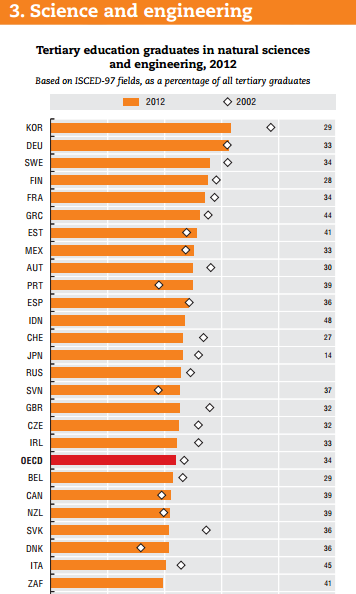Russia is among the 20 most developed countries in the field of natural and technical sciences.
By 2013, the total expenditure on research and development in the zone of the Organization for Economic Cooperation and Development grew by 2.7% and reached $ 1.1 trillion, while their share has not changed since 2012 and is 2, four%. R & D expenditures on the part of states were reduced, and the increase was due to enterprises. The organization notes the importance of investing in R & D and education.
The Organization for Economic Cooperation and Development has compiled the 2015 “Rating of Science, Technology and Industry” .

To compare the level of development of science in countries with different populations used the indicator STEM - the percentage of graduates of the faculties of natural and exact sciences in the total number of university graduates.
')
Russia ranked 15th on the same level with Switzerland, Japan, Great Britain, Slovenia and the Czech Republic, being higher than Canada, Italy, Israel, Australia, the United States and the Netherlands. The rating for the second time in its history was headed by South Korea. In Russia, 23% of graduates come from faculties of natural and exact sciences, while the average rating is 22%.
The first twenty countries with the highest STEM:
1. South Korea - 32%
2. Germany - 31%
3-4. Sweden and Finland - 28%
5. France - 27%
6-7. Greece and Estonia - 26%
8-10. Mexico, Austria and Portugal - 25%
11-12. Spain and Indonesia - 24%
13-18. Switzerland, Japan, Russia, United Kingdom, Slovenia, Czech Republic - 23%
19-20. Ireland and the OECD on average - 22%.
The Organization for Economic Cooperation and Development has compiled the 2015 “Rating of Science, Technology and Industry” .

To compare the level of development of science in countries with different populations used the indicator STEM - the percentage of graduates of the faculties of natural and exact sciences in the total number of university graduates.
')
Russia ranked 15th on the same level with Switzerland, Japan, Great Britain, Slovenia and the Czech Republic, being higher than Canada, Italy, Israel, Australia, the United States and the Netherlands. The rating for the second time in its history was headed by South Korea. In Russia, 23% of graduates come from faculties of natural and exact sciences, while the average rating is 22%.
The first twenty countries with the highest STEM:
1. South Korea - 32%
2. Germany - 31%
3-4. Sweden and Finland - 28%
5. France - 27%
6-7. Greece and Estonia - 26%
8-10. Mexico, Austria and Portugal - 25%
11-12. Spain and Indonesia - 24%
13-18. Switzerland, Japan, Russia, United Kingdom, Slovenia, Czech Republic - 23%
19-20. Ireland and the OECD on average - 22%.
Source: https://habr.com/ru/post/369213/
All Articles